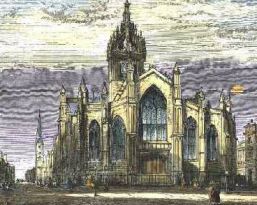
Thomas Aikenhead (baptised March 28, 1676-January 8, 1697), a young Edinburgh medical student who allegedly railed against the Holy Trinity, was judicially hanged for his offence on January 8, 1697. His execution, which raised considerable concern, was the last execution for blasphemy in Britain.
Thomas was the son of James Aikenhead, an Edinburgh surgeon-apothecary, and Helen Ramsey. Nothing is known of his upbringing, except that by age 10 he was an orphan. At age 17, in 1693, he matriculated at Edinburgh University. By then the University library held books by Descartes, Spinoza, Thomas Hobbes and other so-called atheists. While Thomas was a student, Toland’s Christianity Not Mysterious was added to the collection, as was Michael Servetus’ Christianisimi Restitutio. In 1696 the Scottish Privy Council ordered a search for books deemed “atheistical, erroneous or profane or vicious” in the stock of Edinburgh booksellers.
Aikenhead had talked about his reading with friends. After John Frazer was imprisoned and sacklothed for reading deist literature, one of them, possibly Mungo Craig, informed on him. In the autumn of 1696 Thomas was arrested and remitted to the Tolbooth Prison “to be tryed for his life” for blasphemy. He mouldered there until December 23, when he crossed Parliament Square to the High Court to be charged under both of Scotland’s Blasphemy Acts, one enacted before and one after the Revolution of 1689.
The 1661 Act ordained death for anyone “not being distracted in his wits” who shall “rail upon or curse or deny God, and obstinately continue therein.” The 1695 Act confirmed the earlier act but graduated its penalties: first offence, imprisonment and sackcloth; second offence, imprisonment, sackcloth, and a fine; third offence, death.
The charges were that for more than twelve months Aikenhead had blasphemed against God, Jesus Christ, the Holy Scriptures, and all revealed religion. Five student ‘friends’ appeared as prosecution witnesses. Aikenhead was accused of having said that theology was “a rhapsody of feigned and ill-invented nonsense” and made up of “poetical fictions and extravagant chimeras.” It was reported that he had called the Old Testament “Ezra’s Fables” and the New Testament “the History of the impostor Christ who learned magic in Egypt and picked up a few ignorant blockish fisher fellows”. The ‘friends’ told the court that Aikenhead rejected the Trinity as “not worth any man’s refutation,” scoffed at the incarnation as contradictory, professed pantheism, and denied creation. They further reported that he had declared that he preferred Mohammed to Jesus and hoped to see Christianity soon extirpated. Finally, he was accused of having wished, when cold, to warm in Hell.
No defence was recorded, but the prisoner did have defence counsel. On December 24, the next day, came the verdict: “that. . . Thomas Aikenhead has railed against the first person, and also cursed and railed our blessed Lord and second person of the holy Trinity, and further finds the other crimes libelled proven, viz. The denying of the incarnation of our Saviour, the Holy Trinity, and scoffing at the Holy Scriptures.” He was sentenced to be hanged on the 8th of January.
Aikenhead petitioned the Privy Council to consider his “deplorable circumstances and tender years.” Also, he had forgotten to mention that he was also a first time offender. Two ministers and two Privy Councillors pleaded on his behalf, but to no avail. On January 7, after another petition, the Privy Council ruled that they would not grant a reprieve unless the church interceded for him. The Church of Scotland’s General Assembly, sitting in Edinburgh at the time, urged “vigorous execution” to curb “the abounding of impiety and profanity in this land.” Thus Aikenhead’s sentence was confirmed.
On the morning of January 8, 1697, Thomas wrote to his ‘friends’ that “it is a principle innate and co-natural to every man to have an insatiable inclination to the truth, and to seek for it as for hid treasure. . . So I proceeded until the more I thought thereon, the further I was from finding the verity I desired. . .” Aikenhead may have read this letter outside the Tolbooth, before making the long walk, under guard, to the gallows. He was said to have died Bible in hand, “with all the Marks of a true Penitent”.
Aikenhead’s story has been told many times. Thomas Macaulay mistold it to illustrate the dictatorial powers of Scottish clergy. He wrote that “the preachers who were the poor boy’s murderers crowded round him at the gallows, and. . . insulted heaven with prayers more blasphemous than anything he had uttered.” More recently, George Rosie wrote in the newspaper The Scotsman, “The killing of Thomas Aikenhead, like the hounding of Salman Rushdie for the same ‘offence,’ was a disgrace. . . a prime example of a God-fixated state killing a man in an attempt to stop the spread of an idea.”
Archival information on Aikenhead can be found at the Scottish Record Office. T. B. Howell et al., eds., A Complete Collection of State Trials (1809-28), vol. 13 contains an account of the trial. Modern studies include Michael Hunter, “‘Aikenhead the Atheist’: the Context and Consequences of Articulate Irreligion in the Late Seventeenth Century”, in Michael Hunter and David Wootin, eds., Atheism from the Reformation to the Enlightenment (1992) and Andrew Hill, “Heresy and Freedom of Speech during the 300 Years since the Hanging of Thomas Aikenhead” (unpublished lecture given at the Royal Society of Edinburgh, 1998).
Article by Andrew Hill
Posted September 26, 2000